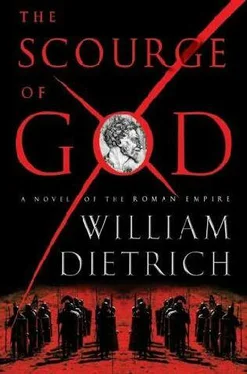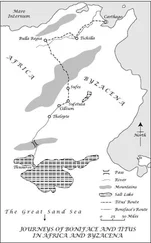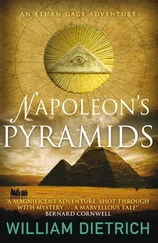William Dietrich - The Scourge of God
Здесь есть возможность читать онлайн «William Dietrich - The Scourge of God» весь текст электронной книги совершенно бесплатно (целиком полную версию без сокращений). В некоторых случаях можно слушать аудио, скачать через торрент в формате fb2 и присутствует краткое содержание. Жанр: Фэнтези, на английском языке. Описание произведения, (предисловие) а так же отзывы посетителей доступны на портале библиотеки ЛибКат.
- Название:The Scourge of God
- Автор:
- Жанр:
- Год:неизвестен
- ISBN:нет данных
- Рейтинг книги:5 / 5. Голосов: 1
-
Избранное:Добавить в избранное
- Отзывы:
-
Ваша оценка:
- 100
- 1
- 2
- 3
- 4
- 5
The Scourge of God: краткое содержание, описание и аннотация
Предлагаем к чтению аннотацию, описание, краткое содержание или предисловие (зависит от того, что написал сам автор книги «The Scourge of God»). Если вы не нашли необходимую информацию о книге — напишите в комментариях, мы постараемся отыскать её.
The Scourge of God — читать онлайн бесплатно полную книгу (весь текст) целиком
Ниже представлен текст книги, разбитый по страницам. Система сохранения места последней прочитанной страницы, позволяет с удобством читать онлайн бесплатно книгу «The Scourge of God», без необходимости каждый раз заново искать на чём Вы остановились. Поставьте закладку, и сможете в любой момент перейти на страницу, на которой закончили чтение.
Интервал:
Закладка:
“Jonas Alabanda?” A centurion had found us on the wall.
I stood, stiffly.
“The general is waiting for your report.” The council of war that evening gave only brief thanks for lifting the siege of Aurelia. All knew a far greater task lay ahead. Some of the Alan captains who had been present at the morning assembly were now missing, having died on the walls. Their place was filled by men from neighboring barbarian kingdoms. Most had never joined in alliance before.
Aetius was our acknowledged leader, and yet there were few present who hadn’t fought or quarreled with him at some point during his decades of maneuverings. Each tribe was proud of its individuality, even while assembling for the unity of Rome. Theodoric and his Visigoths were the most numerous and powerful military contingent. Sangibanus and his Alans were the bloodied hosts of the gathering, the heroes of Aurelia. But there were also the Riparian Franks from the banks of the Rhine; the Salic Franks; the Belgicans; the Burgundians; the Saxons of the north; the Liticians; the Armoricans; and the Roman veterans, the Olibriones. Their weaponry was as varied as their tactics and origins. We Romans fought in traditional fashion, with shield walls and war machines, but the barbarians were as individualistic as their clothing and armor. Some favored the bow, some the ax, some the stout spear, and some the long sword. Hired Sarmatian bowmen would match their expertise with the Huns, and slingers from Syria and Africa would add new missiles to the fray. There were crossbowmen, light infantry with javelins, heavy cataphract cavalry who depended on the shock and weight of their armored horses, sturdy infantry with long pikes, and fire wizards specializing in tipping missiles with burning pitch.
All this expertise depended on our combined will to stand up to Attila. That’s what Aetius wanted to cement this night, in the afterglow of our first great victory. “Attila’s foremost column is retreating,” Aetius told the kings and warlords around him. “He’s lost control of his broader army, scattered across northern Gaul. If we strike now, fast and in concert, we can defeat him once and for all.”
“Is he retreating or regrouping?” Sangibanus asked warily. “Let’s not risk losing the victory we’ve already won.”
“A war half fought is a war almost certainly lost,” Aetius replied. “The Huns exploit every hesitation. Is that not right, Zerco, you who have lived among them?”
“We’ve defeated a finger of Attila’s army, not Attila,” the dwarf said. “Had there been any disloyalty in Aurelia, we would have failed to do even that.” The comment hung in the air.
Sangibanus glowered. “We Alans have done more than our share already, little man. You can hear the wailing as the dead are carried off our walls. I had no quarrel with Attila to begin with, and cease to care about him if he leaves my kingdom.”
“And where does your kingdom stop?” Aetius asked.
“What do you mean? In this river valley, given to us by the emperor of Rome. We have answered his call by defending our holdings and his. Who knows what Attila will do? Maybe he will go back all the way to Hunuguri.” The others laughed at this suggestion, and Sangibanus flushed.
“I mean , Sangibanus,” Aetius went on, “that as long as Attila threatens Rome, he threatens all of us. Including you.”
“I’ve heard this argument a thousand times. To hell with your Empire! It means my warriors die for the rich of Italy!”
“It means that failing to unite means the end of what your people migrated here to get. Rome has stood for more than a thousand years. Gaul has been Roman for five centuries.” He turned to the rest of us. “Listen to me, all of you. Your ancestors came to the Rhine and Danube and found a world of power and riches beyond all imagining. The deeper you marched into it, the more you wanted to be a part of it. The emperors have granted you lands, but only on the condition that you defend the civilization that accepted you. Now you must pay that debt. If Attila succeeds, the world will fall into permanent darkness. If he is defeated, your kingdoms become heir to a thousand years of civilization. Your choice is simple. You can fight to live as free kings in a world of promise. Or wait to be destroyed individually, one by one, your people enslaved, your daughters raped, your wives tortured, your houses burned. Are we cowards, throwing ourselves on the mercy of the Huns? Or are we the last and the greatest of the legionaries?”
There was a low rumble at this speech, most muttering that Aetius was right. There were already too many fallen cities, too many refugees, and too many stories of Hun slaughter. Now there was a chance for revenge.
“The Alans are no cowards,” Sangibanus said sulkily, knowing that Aetius had challenged his courage before every man in the room.
“Indeed they are not, as this siege has proved,” Aetius replied with seeming generosity. “Which means that I give your people the place of honor, Sangibanus: the middle of our line, in the coming battle.”
The king started. The center would undoubtedly mark some of the hardest fighting. It was also the place most difficult to flee from, or switch sides. Once placed in the center, Sangibanus could only fight against the Huns for his life.
Aetius waited. Every eye was on the king of the Alans, knowing that the Roman had outmaneuvered him with words, challenging his manhood and the reputation of his people. Sangibanus gloomily regarded the hundreds of warlords watching him. Then, swallowing, he haughtily raised his head. “The Alans will fight nowhere but the center, and I shall be in their front rank.” A shout of acclamation went up. Now the assembled kings debated over who should have the honor of occupying the dangerous but potentially decisive right wing. That task was finally acceded primarily to Theodoric and the Visigoths.
One by one, the other kingdoms were assigned to a rough order of battle. Princes preened and boasted as their roles became known. Anthus, king of the Franks, wanted to lead the attack on the left in hopes of forestalling the claim to the throne of his brother Cloda. The veterans called the Olibriones asked to stiffen the Alans in the center. The Burgundians wanted a crack at the Ostrogoths.
“What about me?” Zerco piped up, getting a laugh.
“You will be my adviser, little warrior.”
“Let me ride on your shoulders, general, and together we will tower over Attila! He is as squat as he is ugly!” The men laughed again.
“I have a better use. You know the Huns and their language better than almost anyone. Some will be captured and others wounded. I want you to interrogate them about the condition of Attila’s army. If he is indeed regrouping his forces, it will probably be in the rolling farmland beyond the Seine where his cavalry can maneuver. But he will be assembling in a wilderness he has burned. I want to know how long he can feed his men.”
“The rest of us will give him fewer men to feed,” I boasted.
Aetius turned. “No, Jonas of Constantinople, I have a special task for you as well. Rumor persists that this war began in part because Gaiseric and his Vandals agreed to aid Attila in an attack upon Rome. So far, no word of such an attack has come, but if it does all our efforts may be in vain.
We desperately need help from Marcian. I need you to return to your home by ship, with my signet ring, and try to persuade the Eastern emperor to march on Attila’s rear.”
“And thus force the Hun to retreat?” I said.
Aetius smiled. “You have a growing grasp of strategy, young man.”
I bowed. “But not the heart, general.” He raised his eyebrows.
“You do me a great honor by showing so much confidence,” I went on. “What you wish is indeed important. But it will take me many weeks to reach Constantinople by even the fastest horse and ship, and-even if I persuade him-
Читать дальшеИнтервал:
Закладка:
Похожие книги на «The Scourge of God»
Представляем Вашему вниманию похожие книги на «The Scourge of God» списком для выбора. Мы отобрали схожую по названию и смыслу литературу в надежде предоставить читателям больше вариантов отыскать новые, интересные, ещё непрочитанные произведения.
Обсуждение, отзывы о книге «The Scourge of God» и просто собственные мнения читателей. Оставьте ваши комментарии, напишите, что Вы думаете о произведении, его смысле или главных героях. Укажите что конкретно понравилось, а что нет, и почему Вы так считаете.












